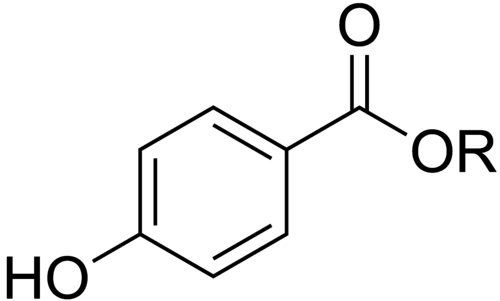Short answer
Parabens are man-made chemicals that have been used for decades as preservatives in a wide variety of cosmetics, pharmaceuticals, foods, beverages and toiletry products. These parabens are known to be absorbed into the body and they are felt to be significant endocrine disruptors. Although the FDA has not banned parabens there are more sensible choices available when purchasing food, health or beauty products.
Long answer
Parabens have been used as synthetic preservatives mainly in cosmetics and toiletries since the 1950s. Now parabens can be found in beer, sauces, desserts, soft drinks, processed fish, jams, pickles, frozen dairy products, processed vegetables and flavored syrups. They are inexpensive chemical preservatives that are utilized to prolong shelf-life of products and to prevent mold and bacteria.
When it comes to topical products that have parabens it important to note that your skin is the largest organ of your body and is very porous. Therefore what goes on your skin goes into your body. The parabens used most commonly in cosmetics are methylparaben, propylparaben, butylparaben, and ethylparaben.
In 2004, a British study detected traces of five different parabens in the breast tumors of 19 out of 20 women studied. This study is small and does not conclude that parabens cause breast cancer but it certainly concerning that almost 100% of these women had intact parabens in their breast biopsies. Intact parabens are unaltered by the body’s metabolism—which is an indication of the chemicals ability to fully penetrate the skin and settle in breast tissue.
A 2014 Danish study printed in the Journal of Reproduction analyzed the urine samples of 200 pregnant women. Parabens and phthalates were found in close to 90% of the women.
Another 2014 study printed in the Journal of Exposure Science and Environmental Epidemiology analyzed the urine samples of 177 pregnant women. Parabens and phthalates were found in almost all samples, which was not a new development. Rather, it was the number of chemicals discovered that came as the real surprise—those levels corresponded with the number of lotions, cosmetics and hair products a woman used. Those who applied more products had much higher volumes of parabens in their urine.
While it’s pretty clear that these chemicals are winding up in our bodies, it’s still unknown what the long-term effects might be. FDA researchers are examining all studies but to date, parabens can still be found in a large number of products.
Animal studies have shown that parabens can interfere with estrogen pathways. Parabens mimic estrogen (because they have similar molecular structures) and may be associated with an increased risk of breast cancer. Scientists believe that this disruption can also lead to insulin resistance, endometriosis and a reduced sperm count in humans. Researchers also continue to investigate potential links to miscarriage and premature birth.
The CSC (non-profit Campaign for Safe Cosmetics) reports that parabens have also been linked to immunological, neurological and skin irritation problems.
So should you avoid parabens? It’s possible to do—and it’s not a bad idea based on suggested correlations between this chemical preservative and serious side effects.
To reduce your risk, seek out paraben-free products. Look beyond the label, as “paraben-free” tends to be more of a marketing spin than a substantiated claim. Read ingredients carefully and avoid any products that contain methylparaben, propylparaben, butylparaben or ethylparaben, as these are the most commonly occurring parabens. It’s also wise to opt for fragrance-free products whenever possible. To protect trade secrets, the FDA does not require manufacturers to list out their fragrance ingredients. That means that one ingredient labeled as “fragrance” could harbor hundreds of different additives... including parabens.
Possible short-term side effects
- skin irritation (systemic contact dermatitis)
Possible long-term side effects
- endocrine disruptor
- increased risk of breast cancer, miscarriage, premature birth and endometriosis
- immune problems
- lower sperm count
- insulin resistance
Ingredients to be aware of
- methylparaben
- propylparaben
- butylparaben
- ethylparaben
- fragrance

Benefits
- prolong shelf-life of products
- prevent mold and bacteria
 Approved by
Approved by 















